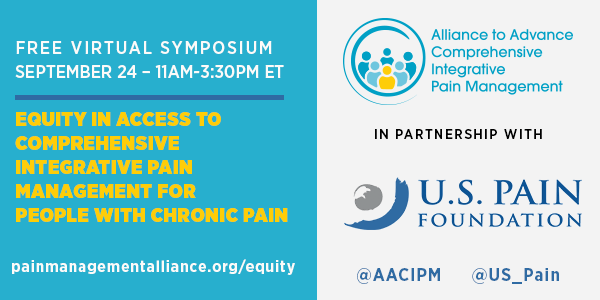FALL 2020 SYMPOSIA
Equity in Access to Comprehensive Integrative Pain Management for People with Chronic Pain
September 24, 2020 — 11:00am-3:30pm ET
During Pain Awareness Month in September, AACIPM hosted this forum in partnership with the US Pain Foundation. This 4.5-hour symposium examines the practical realities for people with chronic pain in the safety net and beyond.
The exciting collection of presenters shared timely information to help us examine access from different perspectives, such as:
- Findings from US Pain Foundation’s August 2020 patient survey about barriers to multidisciplinary pain management
- National Governors Association report, “Expanding Access to Non-Opioid Management of Chronic Pain: Considerations for Governors”
- Big data from a commercial insurer highlighting access to relevant therapies for pain by zip code
- Highlights from University of New Mexico’s current practice examples using ECHO (Enhanced Community Health Outcomes, a tele-mentoring program) focused on pain management during the pandemic
- Demonstration of access in a Federally Qualified Health Center in Austin, Texas

All sessions were recorded and are available on the Symposium Materials page. If you need a certificate of attendence, please contact us at info@painmanagementalliance.org.
Special thanks to our primary sponsor: David and Lura Lovell Foundation
VIEW AGENDA WITH MORE DETAILS
Alliance to Advance Comprehensive Integrative Pain Management
Fall Symposium Series 2020
Equity in Access to Comprehensive Integrative Pain Management for People with Pain
Thursday, September 24, 11:00-3:30 ET
This symposium is facilitated by AACIPM in partnership with the US Pain Foundation. The purpose is to connect the dots among many national efforts to advance access to comprehensive integrative pain management for people who are underserved – this includes discussing the practical realities that exist for people with pain, providers, and payors when it comes to addressing access. A comprehensive approach to pain care is patient-centered, multimodal, evidence-informed, interdisciplinary and starts with a biopsychosocial approach and knowledge of self-management.
11:00-11:10 Welcome, Amy Goldstein, MSW, Director, Alliance to Advance Comprehensive Integrative Pain Management
11:10-11:30 Findings from National Governors Association Report, “Expanding Access to Non-Opioid Management of Chronic Pain: Considerations for Governors”, Kirk Williamson, MPH, Health Policy Analyst, National Governors Association
11:30-11:45 Findings from US Pain Foundation Survey, Nicole Hemmenway, CEO, US Pain Foundation
11:45-12:05 Data about Access to Pain Therapies Based on Zip Code, David Elton, DC, Chief Strategy Officer, United Health Ventures
12:05-12:15 Current Priorities and Changes in Medicaid, Matt Salo, Executive Director, National Association of Medicaid Directors
12:20-1:00 Interactive discussion, Q&A
Moderator: Cindy Steinberg, National Director of Policy and Advocacy, US Pain Foundation
- Kirk Williamson, MPH, Health Policy Analyst, National Governors Association
- Nicole Hemmenway, CEO, US Pain Foundation
- David Elton, DC, Chief Strategy Officer, United Health Ventures
- Matt Salo, Executive Director, National Association of Medicaid Directors
1:00-1:15 Break
1:15-1:30 Perspective from a Person with Pain and Board-Certified Patient Advocate, Maggie Buckley, MBA, BCPA, The Pain Community and Ehlers-Danlos Society
1:30-1:50 ECHO during COVID-19, Joanna Katzman, MD, MSPH, Director, University of New Mexico Pain Center, Medical Director, ECHO Institute — Pain, Substance Use and Public Health Programs
1:50-2:10 An Example from a Federally Qualified Health Center, Sharad Kohli, MD, Family Physician, People’s Community Clinic, Austin, TX
2:10-2:30 Updates from Medicare, Shari Ling, MD, Chief Medical Officer, Centers for Medicare and Medicaid Services
2:35-3:15 Interactive Discussion about Access to Acupuncture as an Example. Acupuncture is a part of a wide toolbox for comprehensive integrative pain management and is beneficial for some people. Earlier presentations in this symposium are highlighting that people with pain are asking for increased access to acupuncture as an option, while other data is showing us that even when coverage for acupuncture is available, access may be extremely difficult. In January 2020, Medicare announced its determination to cover acupuncture for low back pain, which has created great interest, opportunities, and more challenges to work through. What are patients and providers experiencing on the ground? What state examples are helpful to understand when working to increase access to care? What does the workforce look like and how is it being integrated with mainstream care? What specifically does CMS expect as far as supervision? What regulatory issues are important to understand and how does it affect access for people who are underserved? What realities exist for technology (e.g., ECHO, telehealth) when addressing access for all people during the pandemic and beyond?
Moderator: Ariana Thompson-Lastad, PhD, Board member, Integrative Medicine for the Underserved
- Sharad Kohli, MD, Family physician, People’s Community Clinic, Austin, TX
- Mary Faria, PhD, FACHE, President & CEO, AOMA Graduate School of Integrative Medicine
- Shari Ling, MD, Deputy Chief Medical Officer, Centers for Medicare and Medicaid Services
- David W. Miller, MD, LAc, Immediate Past Chair, American Society of Acupuncturists
3:20-3:30 Next Steps and Closing
Amy Goldstein, MSW, Director, Alliance to Advance Comprehensive Integrative Pain Management
Samantha Simmons, MPH, President, Oregon Collaborative for Integrative Health, Director, The Whole Health in the States Initiative
Sign up to receive our updates
